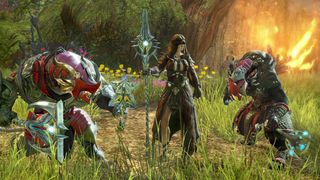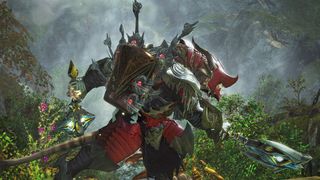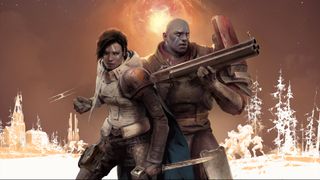How devs are still making big games during the pandemic
What it's like to work on triple-A games from home, three months in.

"I thought I was an introverted person before this," said Kirk Williford, a senior game designer on Guild Wars 2. The world's big game studios are now three months into a dramatic change spurred by COVID-19—offices closed with no firm idea of when they'll reopen, and teams of dozens or hundreds figuring out how to do their jobs over Slack and Zoom. After a few months of working on Guild Wars 2's latest big update from home, then playing other games for escapism in the evenings, Williford realized he's a lot more extroverted than he once thought. Daily casual human contact is one of those things anyone can take for granted when they work at an office, but after months and counting without it, game developers have to find new ways to make games and make do without the water cooler.
Working from home is nothing new for plenty of indie devs, but the pandemic means something very different for triple-A studios with hundreds of employees. What's it like going completely remote for a developer like ArenaNet, which has to keep Guild Wars 2 running smoothly while also working on future updates? Or Bungie or Digital Extremes, whose hundreds of employees are constantly working on events for Destiny and Warframe?
Things obviously will not be perfect, but... we're trying to push out the big things and not getting scared of like, 'oh, can we actually do this?'
Megan Everett
The most basic answer is that they need a few more meetings to keep everyone coordinated, and it's hard to make up for those little interactions, like spinning your chair around to look at what's going on at the artist's desk right behind you. But they've mostly been able to roll with those challenges and keep their games on track.
The unsung heroes behind any game released in 2020 are the I.T. workers who figured out how to get hundreds of PCs ready for developers to take home, or set them up to remote desktop into their work PC. They made it possible for developers to keep working, and at least in ArenaNet's case, they did it absurdly quickly. "We had a two day turnaround," said Guild Wars 2 producer Kye Harris.
At Bungie, planning for the shift started when everyone was still in the building, but "there was a constant rewiring of the mechanism," said Carrie Gouskos, director of product development at Bungie. Their early plans told employees what to do before they left the office to start working from home; later they were allowed to come into the office to do bits of setup, but as the pandemic spread that approach clearly couldn't last. "We realized we were doing the same amount of contact exposure, just slower. If I.T. is still there and every human comes in one at a time and exposes I.T… so [we moved] to contactless delivery using a courier service," she said.
The transition hasn't always been smooth, but because coronavirus looms over everyone, there's a sense that players know things will likely go wrong here and there, especially for big live service games. That's at least part of the reason some studios have kept their games on track rather than delaying them.

Warframe developer Digital Extremes released an update, Operation: Scarlet Spear, in March, and it definitely had problems—but the studio is forging ahead with fixes and more updates for Waframe as scheduled.
PC Gamer Newsletter
Sign up to get the best content of the week, and great gaming deals, as picked by the editors.
"It's not like we're looking at our timeline and being like, 'oh, we can't do that.' It feels almost normal in a way," said senior community manager Megan Everett. "I know we're not physically together in a space anymore. But when I look at our Slack channels and look at all the discussions that are happening and the timelines we have, we're definitely still aiming to do everything that we wanted to do before all of this happened. And that's not to say that, you know, [we won't] miss some deadlines. Things obviously will not be perfect, but it feels like it's moving at a regular pace and we're trying to push out the big things and not getting scared of like, 'oh, can we actually do this?'"
"Operation Scarlet Spear was not perfect, and it was a rough ride," she added. "But I'm still proud that we've put it out during the whole situation that we're in. And I think people really understand that."
Ironically, the monumental task of making a live service game like Destiny 2 actually helped prepare Bungie for the shift to remote work.
"For the people working on the seasonal releases, it was kind of business as usual," Gouskos said. "In fact, the teams that do that work were already set up to work from home because they have to day-in, day-out be prepared for emergencies. Nobody wants to ask people to work overtime, but the reality of a live service is, if something happens to the service in the middle of the night, people are getting called. That's just the way it works. Those teams were actually prepared and kind of paved the way for the rest of us. They were like, 'yeah I can work from home. What do you need to know about it?'"

Making big budget games at home is partially about adapting the game development process, but it's also about adapting games themselves to the reality of the moment. Guild Wars 2's latest episode The Icebrood Saga: No Quarter released on May 26 without voice acting, because it was impossible to get all the actors into the studio before Hollywood shut down. The team talked about delaying the release—ArenaNet prided itself on its voice work, and its episodic releases are heavy on story.
"Guild Wars 2 was a fully voiced MMO. That was a big deal," Williford said. But they determined they could still hit their planned release date and decided to forge ahead without the voices. "It was important. Our players wanted something new to play," Williford said.
No Quarter uses "gutturals" instead of fully voiced dialogue (like the emotes Nintendo still uses in many of its games), and the designers had to find new ways to convey information to players with the UI and sound effects instead of voice. But there also turned out to be a positive to those new constraints: They made Williford's design team think more about the experience Guild Wars 2's deaf players have always had. Many event queues and bits of background detail were conveyed by voiceover or background NPC dialogue, tools the developers didn't have this time around. They eventually plan to go back to No Quarter and add voice recording when possible, but being forced to find those alternative ways to convey information will hopefully carry over to the design of future episodes.

There's definitely a sense at the studio, a renewed sense of purpose around, 'there is an import to what we do.
Carrie Gouskos
Remote work has had some other benefits. Gouskos and Williford both pointed out that over video chat, rather than in big conference rooms, it can be easier for quieter people to speak up with an idea or opinion. Nate Simpson, the creative director on Kerbal Space Program 2, told me that he's gotten a better sense of what it's like for offsite contractors to work remotely and is working to become "a much more attentive lead" as a result. "Now we're all on an equal playing field. We're all offsite," he said.
It can be challenging to focus on anything in the midst of a pandemic, and working from home with distractions like kids, pets, and a tantalizingly close bed make it even harder. The developers I spoke to, at least, were positive about how the teams and their studios have supported them through the stress and distractions.
The Guild Wars team raved about a companywide live video tour ArenaNet arranged with a California goat farm; they were skeptical at first, but it won them over as a fun, wholesome distraction. Bungie offers employees dedicated coronavirus time off, separate from PTO, and an open-ended stipend to spend on just about anything that makes their work from home life better.
Carrie Gouskos summed up a mood that, at least for Bungie, has kept the team motivated through hard times.
"If this is a valuable distraction for people, if this is a comfort or a solace, something we can do that helps in some small way… I think there's been a bit of a renewed effort," she said. People are home. People are tired. People are frustrated. People are sad. For game-makers, we often think about the games that are important to us and what they got us through, and I think there's definitely a sense at the studio, a renewed sense of purpose around, 'there is an import to what we do.' I don't want to make it sound that important. But there is an import."

Wes has been covering games and hardware for more than 10 years, first at tech sites like The Wirecutter and Tested before joining the PC Gamer team in 2014. Wes plays a little bit of everything, but he'll always jump at the chance to cover emulation and Japanese games.
When he's not obsessively optimizing and re-optimizing a tangle of conveyor belts in Satisfactory (it's really becoming a problem), he's probably playing a 20-year-old Final Fantasy or some opaque ASCII roguelike. With a focus on writing and editing features, he seeks out personal stories and in-depth histories from the corners of PC gaming and its niche communities. 50% pizza by volume (deep dish, to be specific).
Most Popular


